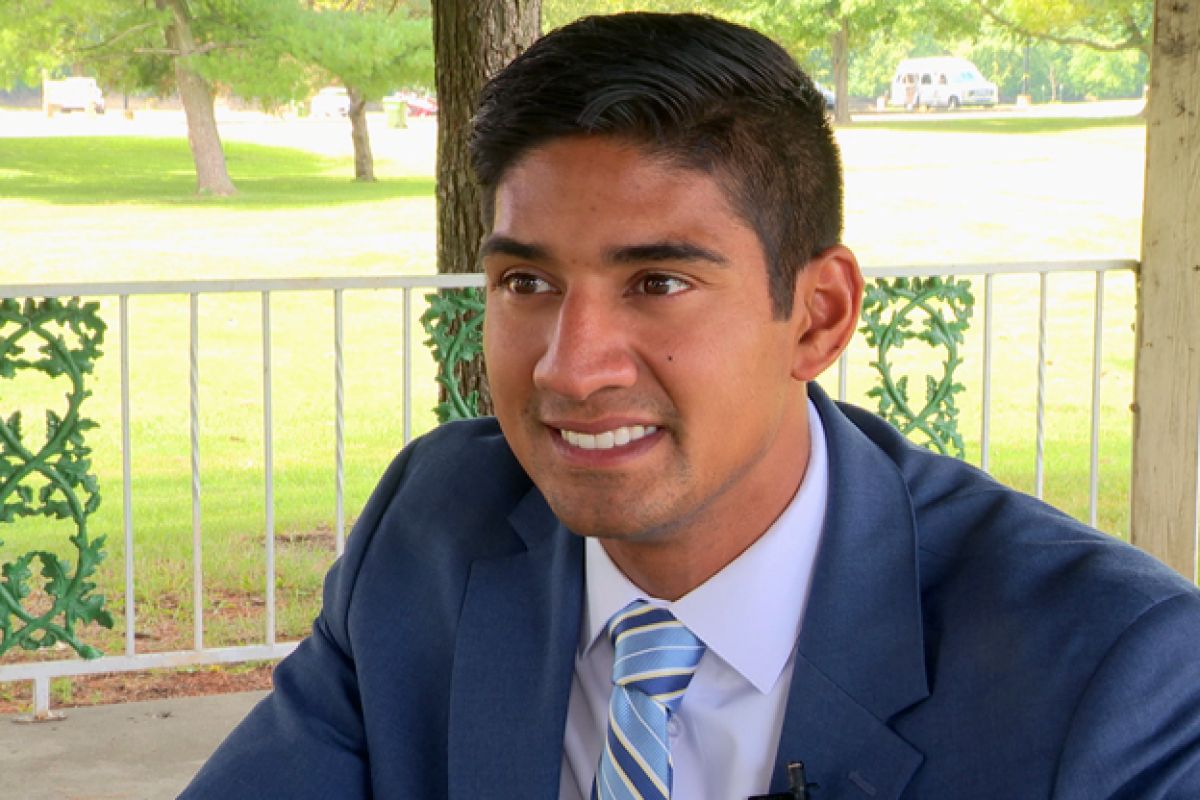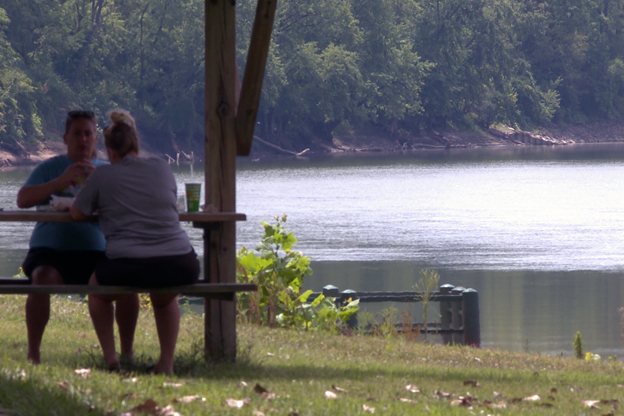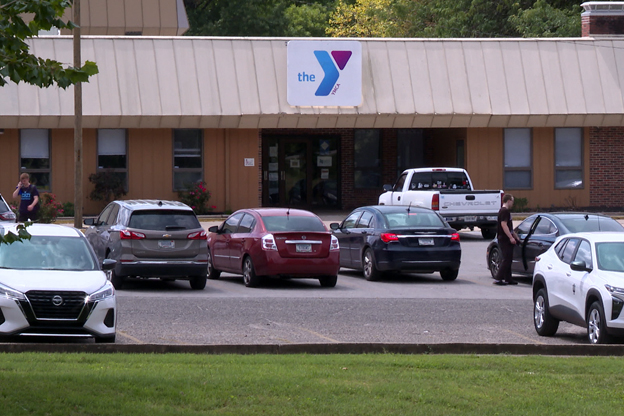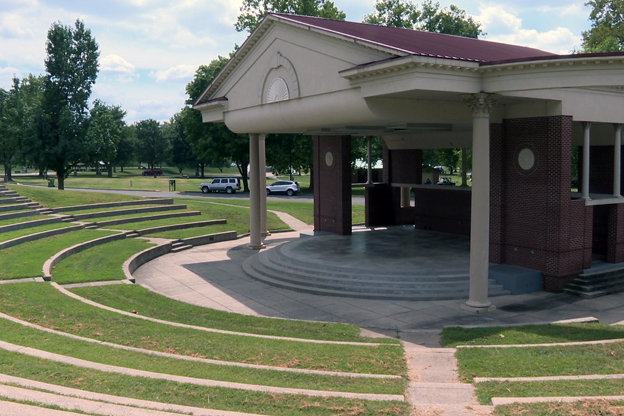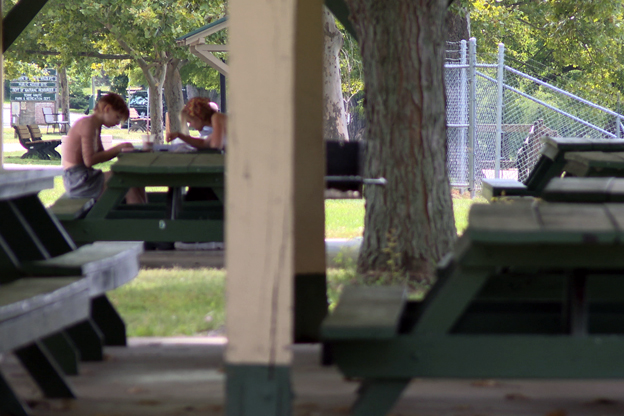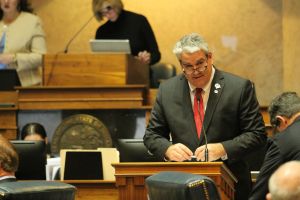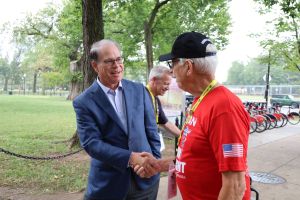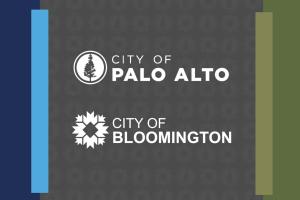Speaker 1
Hello and welcome to ask the mayor on WFIU, I'm Joe Hren. We're at Fairbanks Park in Terre Haute with Mayor Brandon Sakbun, so you might hear some wind and noise in the background, but that's why, thanks for having me and thanks for suggesting being on location. It's nice to be somewhere. I like your office, but it's nice to be somewhere a little different. It
Speaker 2
is. You know, it changes it up. Joe, we're able to come on out here to Fairbanks Park, one of our cities growing parks. We've got a strong parks department, but you know, we're also in the middle of our park's five year master plan. We are finalizing a Riverfront Development Study, and Fairbanks Park is nestled on the river. So it's kind of bringing in the best of those two worlds, those planning spheres that are in operation right now, and we're really looking at unlocking some of our parks these next couple of years, and once that master plan is complete, that'll help us with some funding conversations. Of course, with those casino dollars coming in, that's always a conversation we like to be a part of. But Deming Park is always known as our, our crown jewel. And you know, the fair banks of the world, the Hertz rose Park, they're getting a complete remodel. Those bids will come in here in a couple of weeks into August, and that's a 2.5, $2.6 million renovation of one of our inner city parks. So it's just a great time to be in the City of Terre Haute Parks Department, because we are investing in them. We've got strong summer youth programming in our park system. We've got a great leadership team that's open to new progressive conversations and ideas. You know, what's public art? What's nature? You know, when do we bifurcate in a line in the budget for playground equipment versus supplies for summer camps? I mean, it's just, it's, there's a lot going on. And so I wanted to come out here and show what we've got today, and hopefully in the next few years, we show what we've done.
Speaker 1
Well, I like that. The project is called turn to the river, because it's so fitting so many years. And this is former Mayor Jim Lienhoop of Columbus. Yeah, they're doing the same thing where they're like, at one point, the river was not seen as an amenity hundreds of years ago. It was maybe a mode of transportation or it was dirty. Now cities are saying this is an amenity, and now we can actually use it. Some courthouses were built with the back facing the river, yeah. So now it's kind of like a 180.
Speaker 2
It's time we've come back. You know, I kind of credit a lot of that to the late Mayor Henry, Mayor Tom Henry, up in Fort Wayne. And what they were able to do with their riverfront, of course, you see other, you know, the Owensboro, Kentucky's of the world. And what I like about the city of Terre Haute being nestled along the banks of the Wabash, that is potential. You know, there's, there's some nearby private property owners that we're working with to get some some testing to be done, right? Testing of the soil, what's in there, what needs cleaned up. Of course, we have the Mill, our concert venue, and they're looking to invest in that project, and we're looking to invest in Fairbanks Park in our YMCA. They've applied for some Lily grand funding. So that's a good type. Those are some good projects to show the private sector that the public sector is also taking interest in the river right to do some of those public private partnerships the private sector, you know, they really look to see, OK, what's going on there, outside of our private investment. So it's just, it's a model that we've took to that's been successful across the state, the Midwest, and, honestly, the United States.
Speaker 1
So what initiatives are there? I mean, I'm looking now, and I see a playground. I see shelters, lots of land. What is the city looking at doing?
Speaker 2
So please do take a walk after this and take a look at the amphitheater. Actually, the Mayor's Youth Council is looking at, how do they update the amphitheater? And you know, they want to compete for an IHCDA place making grant. We'll be there to support them, and they're looking at doing the seating and some of the exterior, because amphitheaters are expensive to renovate and they've got a smaller budget. But on top of the amphitheater, we're looking at all the playground equipment. We're looking at updating our shelters this year, handling some of those projects with this year's budget opens the conversation for next year doing true additions to the park. Mayor Duke Bennett, the former mayor, had a very good Fairbanks conceptual designs done last year. Those are those are very costly to implement. So we'll come through some of those. See what opportunities there are. And of course, our YMCA staying strong with them, looking at their possible renovation. On top of that, we've got our nonprofit Wabash Valley crew. They actually want to put a boat house on the river and activate, you know, the sport of rowing here in our community. So there's a lot of interest. Our nonprofit partners at River Escapes, very involved. Our counties also very involved. So just you see a lot of players starting to come to the table saying, 'hey, with some of the public spaces that we own, can we really take a look at that?'
Speaker 1
You use the word costly, which I can't even imagine, but Oh, so you mentioned a lot of funding sources too. What about the state ready grant program? Is that something that could be used for this?
Speaker 2
Hopefully if they do a future ready, 3.0 right? There's a lot of not really concerned, but just a lot of things up in the air with a new administration coming in. So, of course, that election is happening and ongoing, and I kind of let that, that political process just play itself out and stay focused on Terre Haute, that being said, you know, some of those quality-of-life, place-making projects, you know, I personally think we got to relook at that and some of those systems and processes asking the city of Terre Haute to have a large private, public match compared to a city like, you know, Carmel, or those Hamilton, southeastern area, that's where it gets a little difficult to compete with some of those. So, you know, the program I think could get looked at, but the LWCF grant program through the state DNR, that's perfect, right in line with our parks five-year master plan, putting some casino revenue towards it. Of course, the YMCA is in conversation with Lily, which is great. That's a good opportunity for us. So we are looking at different opportunities.
Speaker 1
See, there's a survey just come out for residents to help shape the future of the riverfront. So you're really also getting data as well at this point.
Speaker 2
It is. So it's very important to get our constituent feedback on that and actually do me a favor if you can, and go ahead and put the link to that survey in our article. We do have a parks Master Plan survey that's available on the city website as well, because we get really good feedback, Joe. I mean, you know, something like, you know, kids who have different capabilities and having accessible playgrounds. And, you know, more folks want to bring in public art. Okay, to me, I thought public art's like, well, where's the canvas? Are we sitting amd painting? Incorrect, Joe, it's only a symbol is painting the street lights, the utility boxes around the park, a sculpture here or there. What's the design of our shelters? Those are easy, low-hanging fruit projects that the Indiana Arts Commission and our local artists can handle for us, and as we divide up who's handling what, and that's true collaboration, it takes that word costly and helps spread it out over time.
Speaker 1
Where does Terre Haute get its drinking water? Is it from the river?
Speaker 2
There are some other aquifers.
Speaker 1
Oh, okay, okay.
Speaker 2
Party. Have a community along the east side that was annexed in decades ago that is tied into seeleyville water. And then Indiana American Water is our largest utility provider in the area. And then we do have some individuals still on well water.
Speaker 1
Because when I think about the river to I don't and just, I just don't know. Is it clean? Can it be used for recreational activities?
Speaker 2
People go out very frequently, not just to fish, but to take motorized boats to row, like Wabash Valley crews looking to do a boat house here. So there's a lot of potential for recreational activity along the river.
Speaker 1
What about the river habitat? We talk about environmental conservation, you know, dangers of the river being maybe too deep. I mean, there are lots-
Speaker 2
That's a great question, and that's part of the reason why we partnered with the United States Army Corps of Engineers to really look at the conversation around bank stabilization and water levels. And it was a pretty foreign concept to me, right? I thought, you know, Riverfront Development, little bit of green space parks, and they're like, 'Aha, young man, you know, there's, there's some other sides to this.' And so, our local soil and water conservatory, Vigo County, they've been very good to help us through that conversation, partnering with the United States Army Corps of Engineers as part of our Riverfront Development Study.
Speaker 1
I mean, obviously water, major resource for any community or city. So the Wabash River runs between Lafayette and West Lafayette, and water issues have become a major concern for residents up there in the wake of a proposed pipeline to transfer water from the region down to Lebanon. I believe it's called the LEAP pipeline project. Are you familiar at all that concerns you as well?
Speaker 2
There's always concern. State senator Greg Goode and Tanya Pat our state representative, did a good job of ensuring that, you know, the ifas could do a study in Terre Hautes, a part of that study to look at the water concerns. So they've elevated our concerns at the state level. Granted, we are not, you know, the main, the main front on this battle, of course, that's that's north of us, but we're downstream of the river. So we appreciate their efforts in getting us just a part of that study to get the data to really say, 'Hey, if you do pipeline alpha, it will cause X effect on our river.' So, you know, I'm waiting for the data to really have a strengthening argument or no argument, because it's not an issue. But we do want to wait on the data.
Speaker 1
You mentioned a couple times. Just want people to know the YMCA, I can see it. It's right next to me, so yeah, it is also right on the river. And another an area that we talked about maybe a couple months ago, of trying to renovate and also get the YMCA up to par.
Speaker 2
So that's one of our goals. Our YMCA is one of, honestly, only a handful left. It's got an indoor pool as well. They have a lot of classes, a lot of summer opportunities, a lot of youth opportunities, daycare opportunities. So with our YMCA renovation, we're really trying to tackle a couple of things. Oh, there's a little squirrel by us!
Speaker 1
He wants to be interviewed too!
Speaker 2
So we've got youth programming that we look at, recreational programming, indoor, outdoor course, aquatics, but also child care. Can you know a new YMCA support part of our community's child care concerns and child care concerns. I listen to a lot of your shows with the other mayors. I chat with the other mayors. And, you know, it's one of those problems that I'm hearing whether you're Auburn, Indiana, Westfield, Indiana, city of Indianapolis or Terre Haute, right? You know, we've moved to a society with a lot of two-parent working households, and part of that conversation is having adequate child care. Some folks say, 'Well, you know, that's a state issue or a local issue.' I think it's a community issue at the end of the day, and I am, again, blessed. You know, State Senator Greg Goode and Tonya Pfaff they do stay very informed. They reach out. We recently did a study with Ivy Tech and Indiana State on the problem. Ivy Tech's got some good programs from the employee, employer perspective. ISU is doing an update to their child care facility. So really, our American Rescue Plan Act funds, we are a partner in a child care facility that Casey is hoping to open. So a lot of different groups are tackling that issue. And we do believe that the YMCA could be just a little bit, you know, small piece of that pie.
Speaker 1
We'll also talk about other things on this show really quickly before we go housing update, I see still homes being built. And also, right before we started rolling, you talked about listening to Bloomington Mayor Kerry Thompson's outlook on people who are unsheltered as well.
Speaker 2
Yes, great. So let's start, you know, on the housing end, I had another strong month in July, July of last year, only six new residential units were pulled for construction. That's not including rehabilitation of housing units. This year, we had 14. So you know, that's just showing that our growth patterns are continuing. Equally as important to the conversation is the folks who are unsheltered. You know, we have a lot of agency providers here in the area, right from Hamilton center, reach services, Lighthouse Mission, Mental Health America. So part of that is using our social worker kind of like a point guard on the basketball court, working through the referral system, getting people connected to the agencies that that they need assistance from. Some folks, they need a PO box, you know, they just need to be able to receive and get mail to get some, you know, funding that they are entitled to because they serve this nation and they're a veteran. We have strong partnerships with Habitat for Humanity. They're doing a lot of work for our redevelopment office, and we thank them for that partnership. They're doing, I think six units. I asked them to do 12, and they're like, Mayor, 'oh, we've already doubled.' That's a great crew that we love to partner with. On top of Habitat for Humanity Veterans Village, which is a project from the Terre Haute area Association Realtors as well as our local unions. They're doing work for $0 to support homeless veterans. And thars helped fundraise that project. They went to thrive West Central Indiana for a small grant as well. So that's another collaborative project, but there's a housing conversation, and there's the employment, workforce development conversation to close that gap, we are looking forward to the Goodwill Excel Center's results. They just started their first class pretty recently. What's also interesting, we have new leadership at our work, one Department of Workforce Development our region, so we're looking forward to seeing the changes when it comes to workforce development.
Speaker 1
Before we go any update on road construction?
Speaker 2
Oh, it's all over the place. Now the city and county, we've done a good job of working together. Our sidewalk initiative is in order. We got some funding passed through courtesy of the American Rescue Plan Act. Really connecting neighborhoods to grocery stores to parks. Equally as important as updating our roads. We're putting together a very strong, competitive community crossing grant, and that'll definitely help on that end. Most of that will wind up this next month and a half, but we are looking forward to next year's construction season.
Speaker 1
All right, I know we're out of time. I always like to leave that last minute to you. Do you have any other announcements or things you'd like people to know?
Speaker 2
Well, we're looking forward to the budget, so we're going to unveil our city budget early next month. There are some strong quality-of-life investments, investments to our parks department, investments into many of our city apartments that haven't received updated equipment for generations. I mean, some of these guys and gals are using equipment that's older than me. So we're going to address some of those efficiency conversations, we are looking to invest in our waste water, storm water operations, some of our main lift stations, and, of course, public safety. It is 60% of the Terre Haute budget is police and fire. So it can be tough at times to find, you know, the right funding sources to keep them up to speed. But we are always open to those conversations and looking forward to early September.
Speaker 1
I know you mentioned this as follow up really quickly. I mean, obviously this is your first city budget going through your first year as mayor. What are you learning, or what are you seeing as this is all unfolding now as we start to, you know, take x and move to y and y to z.
Speaker 2
You know, I think the property tax conversation is always an interesting one. I understand that assessments have changed, but, you know, with the property tax caps in that assessed value, that 1% homestead tax, other communities around the state, they have other TIFs that are bringing in a lot of money, or their net assess value their communities is simply higher. So you know, our circuit breaker really affects the city of Terre Haute, thankfully, now we have some casino revenue. But how limited is that going to be? Not every year is going to be the same. So anytime there's a conversation around property tax, I I always remind individuals this funds our police department, our fire department, our street department, you know, street department used to have 80 some employees in the 90s. They're down to 34 our cemetery department used to have 24 they're down to nine. Our parks department used to have 50 they're down to less than 30. You see where I'm going with the conversation. And these are core city services that you know don't have the labor that they used to, so you're doing more with less. And it can be difficult conversations, but it's important to understand that, you know, I always tell folks, state and local government, you actually get what you pay for if you want to be in a low tax state, okay, expect less municipal government services than some of our neighbors in the Midwest, and that's a choice that we all make as mayors. We're going to do our best to live within our means and handle our budgets and try to progress and move forward, whether we have 10 apples or five apples. And it's, it can be fun. You can get a little bit of gray hair, but it's, you know, always these, these difficult conversations, I always say, they should lead opportunities, right? What are our opportunities with the limited resources that we have.
Speaker 1
Thank you so much for your time.
Speaker 2
Thank you.
Speaker 1
Hope to see you next month.
Speaker 2
Absolutely, good to see you again.







